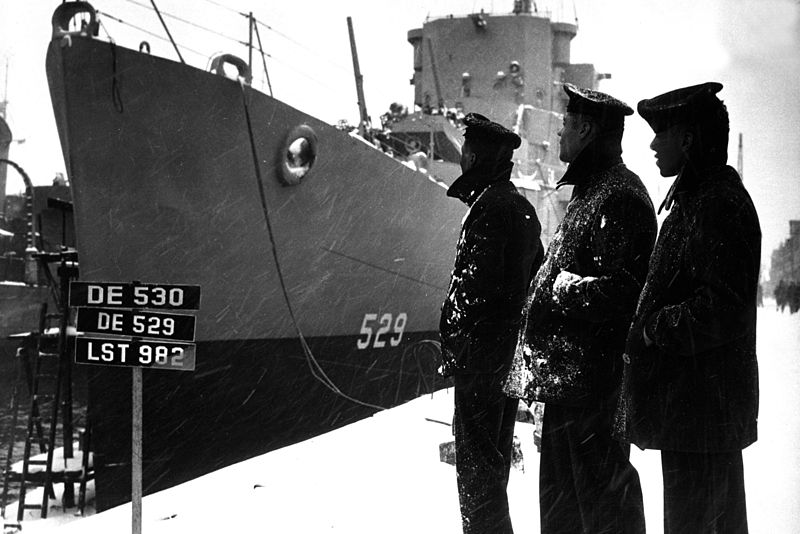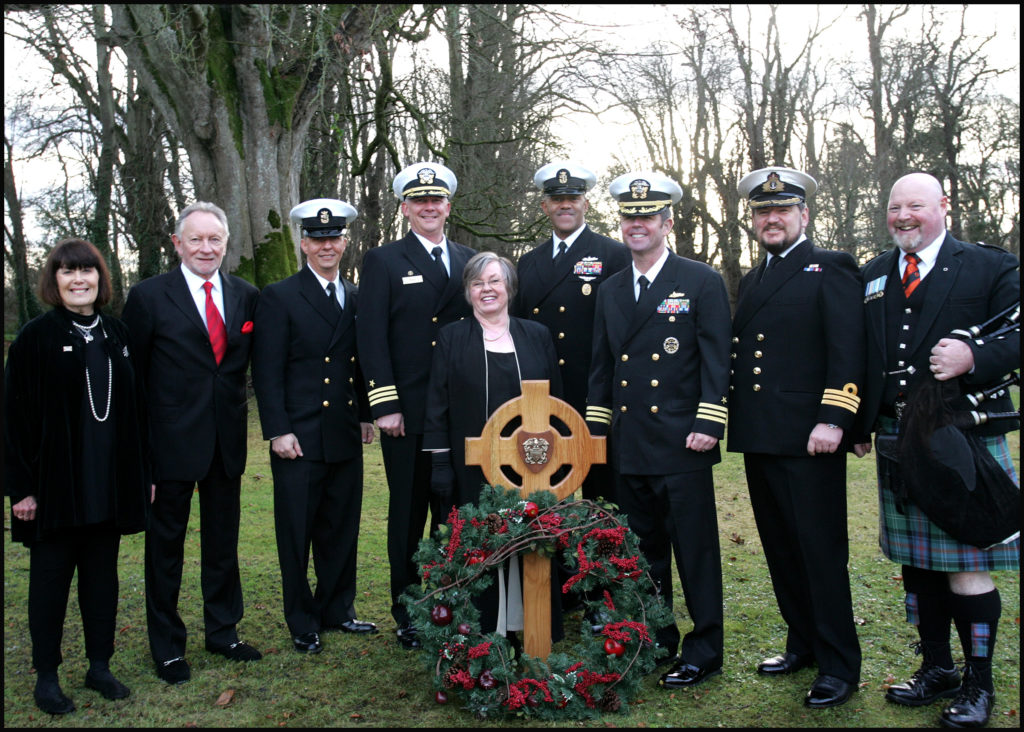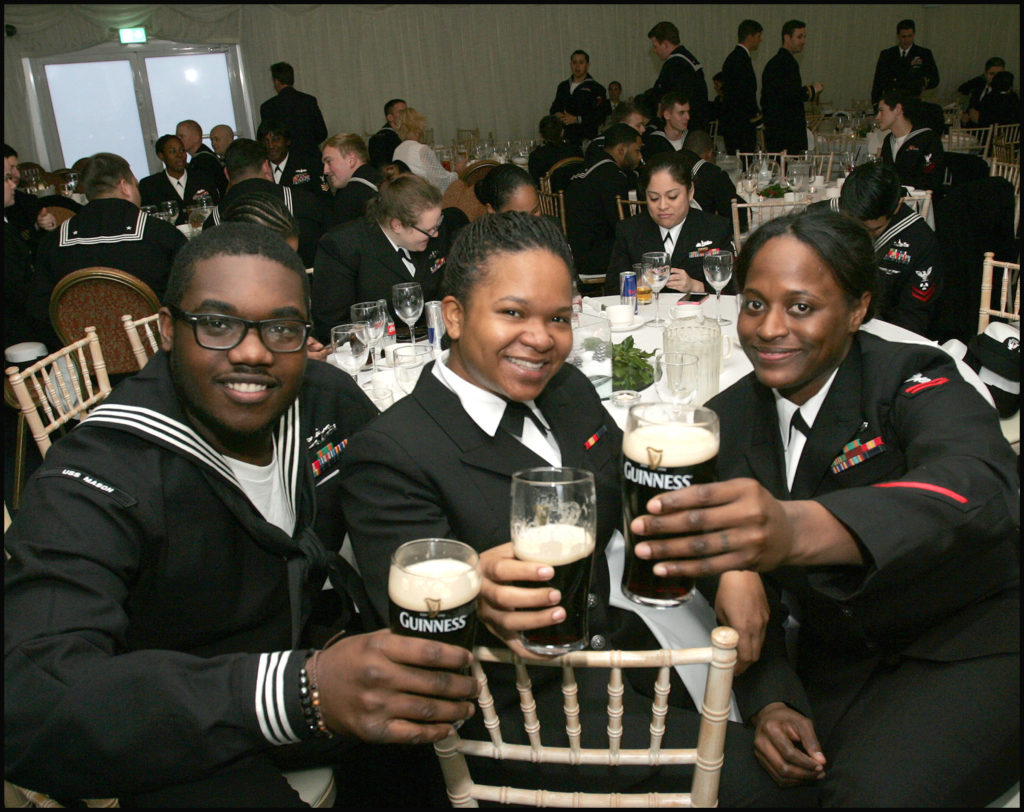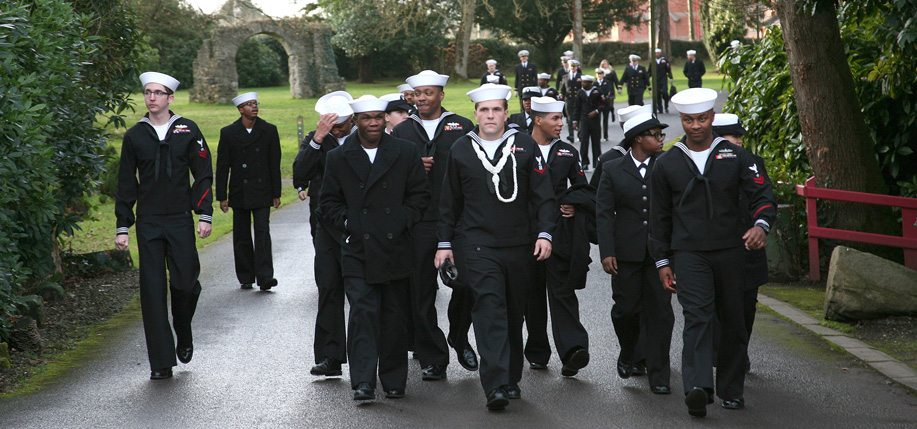Last year, the U.S.S. Mason arrived in Derry, honoring the crew of the ship’s World War II namesake, which made port in Northern Ireland in 1944.
Standing shoulder-to-shoulder, squared up in their dress blues, shoes and buttons shining, the officers and crew of the U.S.S. Mason (DDG-87), 250 strong, faced the Celtic Cross Memorial in front of Beech Hill House Hotel, Derry that had been erected by a group of local people. Headed by Nobel Peace Laureate John Hume, hotel owner Patsy O’Kane, and manager Conor Donnelly, they had established an association 20 years before to honor the thousands of U.S. sailors and marines who made this city their home away from home during World War II and restore the historic links between the people of Derry and the U.S. Navy and Marine Corps. The grounds of Beech Hill House had served as a camp for many of these service people and the hotel has become a center for exploring this history.
Commander Christopher Gilbertson, commanding officer of the Mason, and Fleet Master Chief Raymond D. Kemp placed a wreath of holly and red berries in front of the memorial while Irish Army veteran, Jim O’Hagan, piped a lament.
December 18, 2016 marked 75 years since the U.S. Navy set up what would be become known as Base One Europe. The facility, which included an innovative hospital and a state-of-the-art ship repair yard where civilians of the entire island of Ireland were employed, was so crucial to victory in the Battle of the Atlantic that at the war’s end, the Nazi U-boats were ordered to surrender in the Foyle River. Naval Historian Joseph Sardo estimated that without Base One Europe, WWII would have been prolonged for two more years.

But as well as commemorating the past, this ceremony celebrated a present moment when, in Seamus Heaney’s words, “Hope and history rhyme.” The U.S.S. Mason (DDG-87) is actually the third ship of its name, designated in honor of the sailors of the second U.S.S. Mason (DE-529), a WWII destroyer and the first combat ship to have a predominantly African-American crew. (The first Mason was named for secretary of the Navy John Young Mason and was decommissioned in 1941; the second was named for Navy pilot Ensign Newton Henry Mason, who was posthumously awar-ded the Distinguished Flying Cross and was decommissioned in 1945.) Though the crew of the second Mason performed heroically, the men were serving in a segregated navy and had to endure racist taunts while in uniform from the very American civilians they were defending. But then they came to Northern Ireland. “Irish First to Treat U.S.S. Mason Crew as Americans,” the Journal and Guide of Norfolk headlined an article describing the men’s experience.
“We were called Yanks,” Signalmen Lorenzo Dufau said in the article. “There was no prejudice, just genuine human kindness.”
I discovered the U.S.S. Mason story while researching a piece for Irish America. I found Mr. Dufau and his shipmate James Graham. They had been trying for 50 years to tell their story. This magazine afforded them a platform. Eventually, I worked with the veterans on a book for the Naval Institute Press, a PBS documentary for which Phil Coulter wrote the theme song, “Home Away from Home,” and on the 2004 feature film Proud, starring Ossie Davis, Stephen Rea, and Aidan Quinn, which was funded by Tommy Hilfiger, who came to Derry for the 2002 filming.

In 1995, President Bill Clinton recognized the men’s service and the navy awarded them the commendations for which they had been recommended in 1944. But the men’s greatest thrill came when the U.S. Navy named this ship for them in 1996, complete with the motto they had coined for themselves “Proudly We Served,” and a coat of arms that contained a shamrock that commemorated their Irish visit. And now, the U.S.S. Mason (DDG-87) had sailed into Northern Ireland, completing the circle. But this crew represented a very different navy, where diversity is valued and men and women of all backgrounds serve at every rank and in every capacity.
“We owe so much to those men,” said Fleet Master Chief Kemp, whose responsibilities include U.S. Naval forces in both Europe and Africa.
After the ceremony, he reflected on his very special connection to both ships. His first command chief master tour was aboard the present U.S.S. Mason. But on a visit to his hometown, he discovered that his high school girlfriend’s uncle was Lorenzo Dufau.
“It was awesome to discover this connection to the man who was key to the ship’s proud legacy. I arranged for Mr. Dufau to visit the crew in Norfolk. He told us we would fall in love with this piece of iron and the history it represented. He was right.”

The wreath laying was followed by an interfaith service hosted by Rev. Niall Farren of St. Mary’s Church, Ardmore, whose great uncle served as military chaplain to the American forces in Northern Ireland during WWII, for which he was awarded the U.S. Medal of Freedom. Both of Derry’s bishops, Rev. Donal McKeown and Rev. Ken Good, Church of Ireland, participated. Bishop Good’s wife told the assembly that her father served in the U.S. Navy during WWII. Rev. David Latimer, First Derry Presbyterian, offered a prayer, as did Rev. Michael Canny. Phil Coulter, Ireland’s official Ambassador of Song, performed “Home Away from Home” and “The Town I Love So Well” accompanied on the violin by Frank Gallagher. The Columbkille Ladies Choir, which has performed at the White House, sang a medley of Christmas carols and then the Mason crew joined them in “The Battle Hymn of the Republic.”
The day concluded with a festive Christmas dinner for 400, which Fleet Master Chief Kemp described as “fit for royalty.” Gifts were exchanged. The crew mingled with the people of Derry and met Member of Parliament Mark Durkan. There was dancing.
When Commander Gilbertson spoke, he expressed his gratitude for all of the events of the entire weekend – the reception at the Guildhall by Mayor Hillary McClintock, the screening of Proud at The Playhouse, hosted by Pauline Ross and the Beech Hill House celebrations.
I reached Commander Gilbertson after they returned to the U.S. He summed up their feelings this way: “The entire crew absolutely enjoyed the all too brief visit. They were in awe of the wonderful reception we were given! The opportunity to celebrate the rich history we share was incomparable, and many of the sailors will remember it for a lifetime, much like our namesake, the great men of U.S.S. Mason (DE-529), did.”
Like the WWII ship the present Mason had also been in harm’s way, facing attack in the Red Sea.
“After successfully defeating multiple missile attacks in October, the visit served as a superb end to what was an historic deployment for the crew,” Gilbertson said. ♦


Leave a Reply